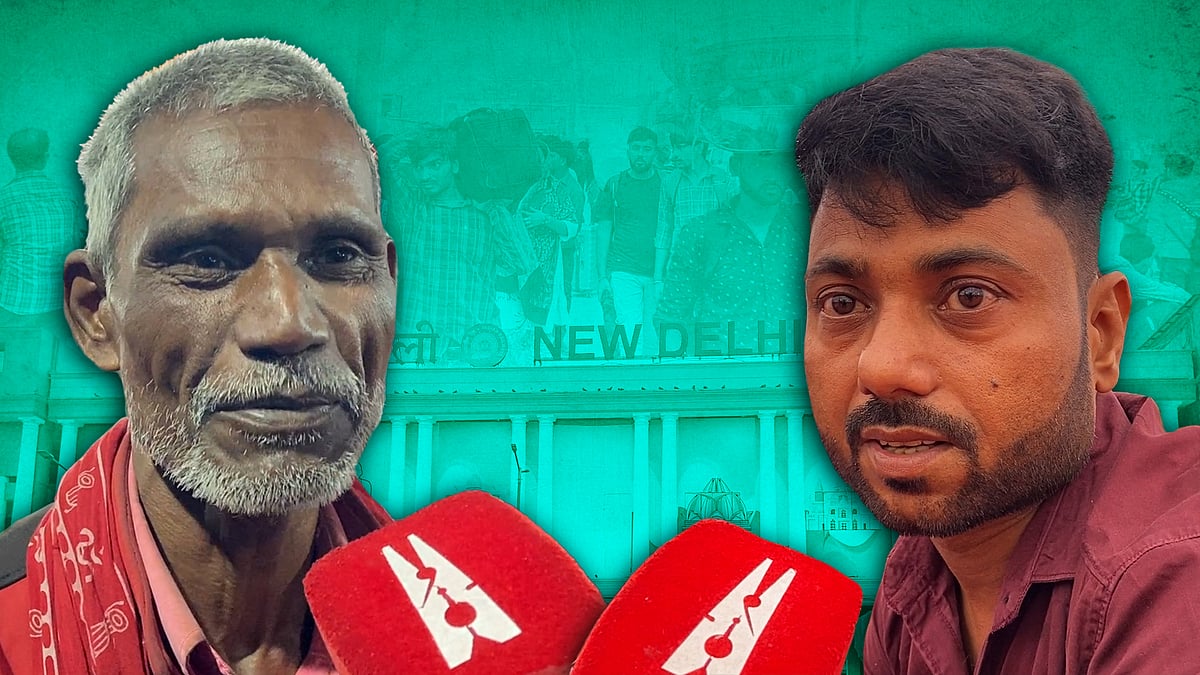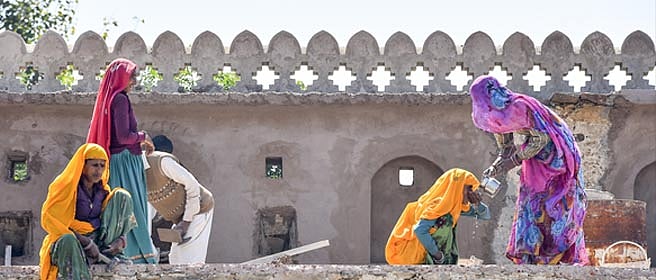Corruption, bad working conditions: How MGNREGA continues to falter in Bihar
MNREGA workers have been protesting against alleged fraud by government officials and poor working conditions.
Men migrate in search of work, leaving their wives behind
The 2023 Multidimensional Poverty Index released by Niti Aayog ranks Bihar at the top in the list of states suffering from multidimensional poverty. The men in the state migrate for work; studies suggest that 85 percent of migrants from Bihar are men.
The women they leave behind express strong interest in MGNREGS work, which helps them earn a little extra while still leaving them some time to manage household tasks.
Women see MGNREGS work as a gateway into the wage market. It grants them greater control within their families. The surplus money earned is primarily invested in necessities such as children’s education and healthcare. In its absence, children tend to discontinue education and engage in migrant work.
Anuradha Talvar, a veteran trade union activist, points out that women utilise the money they earn prudently, and do not indulge in activities such as alcohol and gambling. Ranjan Kumar agrees. “The women who we work with in blocks of Vaishali district mostly tend to use the MGNREGA money that they get on their children and their own needs, like health,” he says.
If poor, rural women can control their access to MGNREGS wages through bank accounts and receive adequate training for handling it, they are more likely to join or continue in the labour workforce in India, IndiaSpend reported in January 2020.
Unfavourable working conditions
Pramila Devi, who secured only a few days of work this year, highlighted the challenge of spending nearly 40 minutes walking to reach the worksite. When she was working at a site, she had a leg injury. There was no first aid kit on site.
In another instance, she remembers that the labour group had to use a hand pump installed in a nearby villager’s house because there was no plan in place by the authorities to provide drinking water. The villager was uncomfortable with the workers using the hand pump for prolonged and repeated periods, and this caused friction. “We carry our own water bottles from home,” Pramila Devi says.
Sanju Devi is a mate who hails from Muzaffarpur district’s Dumri village of Mushahari block. She is associated with the Gramin Vikas Manch, a local workers’ organisation. Based on her experience, she stresses the need to have temporary restrooms at the worksite and points out that in their absence, women workers are forced to make use of bushes or trees as cover while they relieve themselves. The situation becomes even more complicated when a woman worker is menstruating, Sanju Devi points out.
There was no crèche available at the worksite as mandated by the rules. The immediate elder children accompany their mothers to work in order to help take care of the younger ones.
Ranjan Kumar from JVSS works in seven to eight blocks of a total 16 blocks of Vaishali district. He identifies Patepur, Mahua, Jandaha, Chehrakala, Garaul, Bhagwanpur, and Patedi Belsar as the blocks where no crèche facility is available, despite the organisation putting pressure on the government.
In Muzaffarpur district, the organisation is active in all 16 blocks. “We have visited two to three panchayats of every block where the organisation is active, and no childcare provision at the worksite was to be found.”
Santosh Kumar, a local activist associated with the Gramin Vikas Manch (GVM), highlighted the absence of crèche facilities in the four blocks – Mushahari, Gaighat, Kurhani and Muraul – in Muzaffarpur district.
The Ministry of Women and Child Development is expanding child care services through Aanganwadi cum Crèche (AWCC) as part of Mission Shakti’s Palna sub-component. The aim is to offer a high-quality crèche facility, ensuring a safe environment for children aged six months to six years. “In order to facilitate their [women’s] entry into the workforce, there is a need for quality child care services," reads the announcement.
“The announcement shows the government's awareness of childcare facilities,” Talvar says. “However, when a scheme like MGNREGA already has an approved provision, it should be implemented.”
She points out that women workers often talk of the absence of even basic toilet facilities at the worksite.
Renu Devi, 28, a resident of the Patepur block of Nirpur Panchayat, received 12 days of work in the year 2023 – first for five days, and then for a week. On her worksite, every employee was a woman.
She has a three-year-old child and her two other companions were also mothers of small children. “We are not asked if we have children that we may be bringing to the worksite,” she told IndiaSpend. Her three children are three, five and eight-years-old, and they often go to work with her.
Even though the allotted task was completed over two months ago, she has still not got her wages for a week’s work. The Gramin Rozgar Sevak avoids answering her questions and dodges by saying, “Aaega aaega paisa (Money will come)”, whenever she inquires about employment or the payment of wages for work previously completed.
Renu Devi says, “Thirty-four people applied for a labour card from our village and only 12-14 of them received the cards. Others’ request was declined on the grounds of lack of appropriate paperwork but no one advised them about the process.”
“Women are being neglected due to bureaucracy and the dominance of males. The MNREGA came with the promise of not just providing work but work on equal footing of men and women. However, while there are complaints about gender disparity in payment at several places, the bigger problem is the failure to stress on women-friendly work and delay in clearing wages.”, says a study published in the International Journal of Advanced Research in Commerce, Management and Social Science.
Another common complaint is that job cards of workers are often deleted without prior intimation.
The Minister of State in the Ministry of Rural Development told parliament that job cards are deleted to weed out fake/incorrect cards, duplicate cards, or when the family is not willing to work, has permanently shifted from the gram panchayat or if the job card has a single person, who has since died.
Activists, however, point out that willing workers have had legitimate job cards deleted, and further that it does not answer the question about lack of prior intimation.
When asked if MGNREGS’s issues would be a factor influencing the women’s vote in the upcoming Lok Sabha election, Sinki Devi doesn’t offer a definitive answer. “The politicians who come seeking votes in the village hardly do anything for us,” she says.
While questioning the political will of the union government to successfully implement MGNREGS, Talvar also sees it as a partial failure of labourers’ organisations that the mismanagement of the scheme would not significantly influence women’s voting decisions in the Lok Sabha elections. Vaishali falls under Ujiarpur Lok Sabha constituency. Since 2014, Ujiarpur has had an MP from the Bharatiya Janata Party.
Schemes like MGNREGS lack immediate visibility in the lives of many women due to the already low number of workdays and delayed payment in numerous states, she points out. Consequently, the rights-based framework that this scheme has is not perceived as a fundamental entitlement by women holding labour cards.
Few women in supervisory roles
To improve women’s participation in supervisory roles under MGNREGS, the Bihar government issued a policy to encourage ‘Mahila mates’.
A mate’s responsibilities include organising groups of workers, outlining the tasks that are needed to be completed in order to receive the minimum wage (as specified in the ‘Schedule of Rates’), and keeping track of workers’ names and attendance on a daily basis on muster rolls kept at the workplace. The policy leverages the self-help groups to improve women’s participation.
The mates are instructed in how to use the NMMS app to mark workers’ attendance. Any day missed results in loss of wages for that day. The primary responsibility of the GRS, which is an appointed post, is to support technical personnel in strengthening MGNREGA-related work.
Pankaj Prasun is a Gram Rozgaar Sevak (GRS), an appointed post to support the panchayat in MGNREGS-related work. A mate that Prasun knows used to borrow a phone from her neighbour for work purposes. Block officers helped her purchase a phone after her neighbours stopped helping. “I have forwarded this concern to the higher authority, but maybe the state government is first trying to check the success of the mate programme,” he said.
The lack of mobile network and problems in registering attendance is affecting timely wage payments for workers, IndiaSpend reported in May 2023.
In the block to which Prasun has been appointed, most women are not aware of the role of a mate. “In the past year, we have had one training session, but it was insufficient to provide them with all the knowledge. Currently, all we have to do is assign a group of MGNREGA workers to a mate, which goes against the principle of how this system ought to function.”
The mate bears direct responsibility for verifying the legitimacy of the information contained in the muster records and the calibre of labour performed. They are responsible for ensuring that the following amenities are provided at the workplace: a place to live, a medicine kit, and workers who are assigned to provide water and child care. The mate is also tasked with responding to crises, such as workplace mishaps.
Many of the women who applied to be a mate had no idea what the obligations of a mate were. “They were told to fill out the form and submit it to the Jeevika office, and that is what they did. It will take some time for the mates to completely understand and act upon the purpose of their appointment,” the area’s GRS said.
Ranjan Kumar has also raised concerns regarding block officers assigning their acquaintances the task of marking attendance on the NMMS app.
“At times, the mate's husband comes to the worksite,” Kumar says. “They are not sincere in marking attendance. This affects the workers, because without attendance recorded on the app, payment for the day's labour won't be processed even if the person has worked.”
As a result, women workers have been demanding that one among them be appointed the mate. “The training that the mates have received is not qualitative,” he says. “We train our workers in the union; therefore, we demand their appointment. The government should be more efficient with the training of mates.”
This report is republished with permission from IndiaSpend.org, a data-driven, public-interest journalism non-profit. It has been lightly edited for style and clarity.
 In Bihar, low registration for govt scheme keeps pregnant women from accessing healthcare
In Bihar, low registration for govt scheme keeps pregnant women from accessing healthcare ‘No hope, no facilities’: Migrants board packed buses, trains to Bihar, UP for Chhath
‘No hope, no facilities’: Migrants board packed buses, trains to Bihar, UP for Chhath He’s now Bihar’s longest serving CM, but can Nitish handle future political challenges?
He’s now Bihar’s longest serving CM, but can Nitish handle future political challenges? Worst year ever for MNREGA with 23% decline in assets
Worst year ever for MNREGA with 23% decline in assets